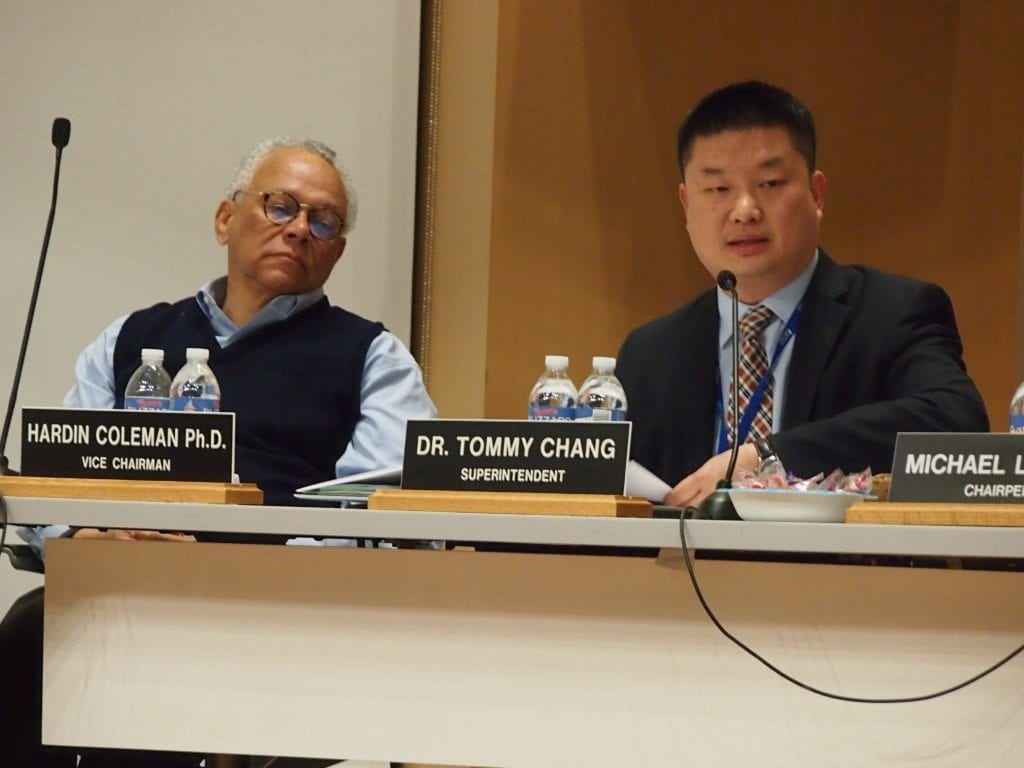BPS budget has modest gains, cuts to 15 schools
BPS officials say growing share of funds going to charters

Boston Public Schools Superintendent Tommy Chang last week released a school year 2019 budget with a 4.4 percent increase in overall school funding.
While Chang and BPS officials touted the budget’s investment into schools, the majority of parents and BPS employees who testified during the School Committee meeting on Feb. 7 called for greater investments in schools and staff, citing the effects of several years of cuts.

Karina Paulino testifies on cuts to the the Hurley School during a School Committee meeting on the BPS budget.
BPS officials said diminished state funding continues to impede further investments in Boston schools, noting a $17 million shortfall in local aid in Gov. Charlie Bakers proposed budget for fiscal year 2019. In addition, the Legislature has for several years level-funded the reimbursements that partially compensate cities and towns for the funding they lose when students leave the district for charters.
“The city has continued to support BPS despite declining state aid,” Chang told reporters before the School Committee meeting.
This year, state Chapter 70 funding for education will account for just 4 percent of the BPS budget, down from 30 percent 20 years ago as charter schools in Boston have expanded and state Chapter 70 education funds have remained largely flat. More than 90 percent of the $219 million the city receives from the state will go to charter schools next year.
This year, 15 schools whose enrollment has declined will see their budget reduced, due to the district’s weighted student funding formula, under which schools are funded by the student. When students transfer from a school, the funding follows them to the school in which they enroll. At the same time budgets are increasing at chools with a net increase in students.
Brighton High School, a Level 4 school with a large English language learner population that last year entered into a state-mandated turnaround plan, is slated to lose $790,000. Dorchester Academy, an alternative high school that saw its enrollment drop after BPS officials encouraged students to transfer to other schools, is slated to lose $1.4 million.
BPS officials tout the fairness of the weighted school funding formula, noting that before it was instituted, schools were sometimes funded according to how much political pressure they could apply to the district.
Critics of student weighted funding, some of whom refer to it as a “backpack full of cash” scheme, say it disproportionately affects schools with high needs populations and schools in low-income communities. While the system essentially lets parents chose which schools thrive and which ones tank, the gains and losses in students and funding are often out of the control of school leaders.
Parents from the Winship School who testified at the School Committee meeting said the school’s budget was cut by $338,550 because the school isn’t able to offer Advanced Work Class, a program that starts in grade 4.
“Forty percent of Winship third graders qualified for Advanced Work, which means most left the school,” said parent Lynnelle Pittet.
The Winship parents said they have asked to have the Excellence for All program, which Chang is implementing as a replacement for Advanced Work, but BPS officials have yet to approve the request. In the meantime, the school will have to weather deep cuts to its budget, noted parent Matt Hodge.
“We’re a school in transition,” he testified. “We recognize that. But the changes we’re facing next year are not changes we can survive.”
District 7 City Councilor Kim Janey praised the school department for its work on the so-called opportunity gap — the lower test scores and graduation rates in black and Latino student populations — but called for greater investment.
“That work cannot be done if we’re not investing in our schools and our children,” she said.
At-large Councilor Annissa Essaibi-George also called for greater investment, citing the need for school psychologists, nurses and social workers in every school. Currently many schools do not have full-time nurses and there are only 56 school psychologists in the district 126 schools, creating a 1-to-1,111 ratio of psychologists to students in the district, noted school psychologist Jacqueline Rodriguez.
Numerous school psychologists testified about their struggles to meet the needs of students in crisis working in multiple BPS buildings during a given week. Cuts to school budgets have forced principals to make difficult decisions, said psychologist Kelly Gallagher.
“Do I keep the psychologist, or do I keep the social worker?” she said. “The services right now are delivered in a very fragmented manner.”
The school department’s $48 million increase in spending brings the BPS budget to $1.09 billion, and includes $30 million in pay raises for teachers. The administration of Mayor Martin Walsh negotiated those raises with the Boston Teachers Union last year. Last year’s BPS budget also included $20 million set aside for the raise.






